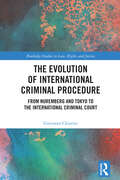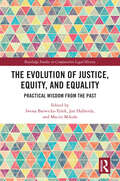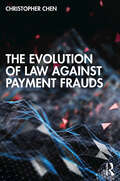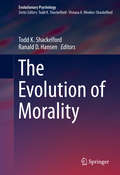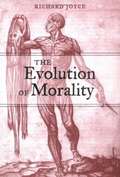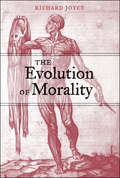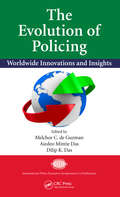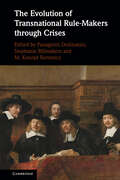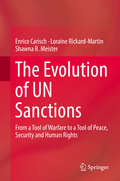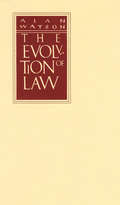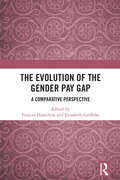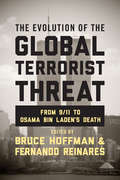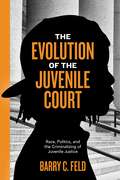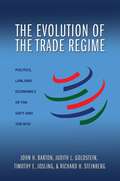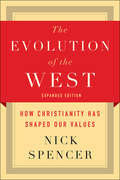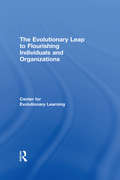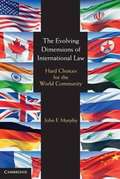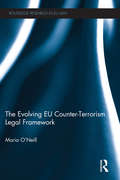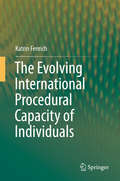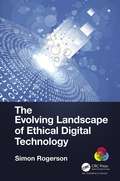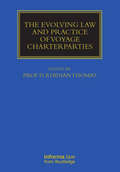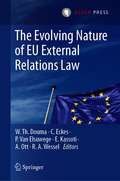- Table View
- List View
The Evolution of International Criminal Procedure: From Nuremberg and Tokyo to the International Criminal Court (Routledge Studies in Law, Rights and Justice)
by Giovanni ChiariniThis book examines the evolution of international criminal procedure from the 1945–1946 Nuremberg and Tokyo trials to the present period. It is largely based on a normative-jurisprudential approach to the procedural rules, comparing both norms and case law of the relevant courts and tribunals. The book shows the possibility of classifying “international criminal procedure” as an autonomous concept and field of study, which is constantly evolving due to the interaction of different legal cultures that characterizes this subject matter and is derived from the varied procedures as established in both statutory law and jurisprudence. Far from being an autonomous entity, international criminal procedure now represents a great compromise between the legal traditions of different ICC member States. What emerges is the historical evolution of an international criminal procedure with a unique identity, a very real “third way” between the traditional dichotomy of common law and civil law, between the Anglo-Saxon and the European Roman Law-oriented legal traditions. The book will be of interest to academics, scholars, and researchers working in the areas of international criminal law, comparative law, criminal procedure, and legal history, as well as judges and international legal professionals.
The Evolution of Justice, Equity, and Equality: Practical Wisdom from the Past (Routledge Studies in Comparative Legal History)
by Iwona Barwicka-Tylek, Jan Halberda, Maciej MikułaThis book presents a comprehensive exploration of historical perspectives on justice, equity, and equality, which have been, and still are, considered as the core values of any balanced political system. Combining historical methodology with wider philosophical and ethical insights, the volume offers a unique contribution to the fields of legal history, legal heritage, and legal culture. Bringing together scholars who specialise in different historical periods, the book covers a variety of concepts and practices, but also identifies some universal ideas about justice, equity, and equality that have been stimulating the development of the European political and legal tradition throughout the ages. In this way, it provides a multidisciplinary approach that advances the field of legal studies. By bridging the disciplines of history, law, and philosophy, the book demonstrates the interconnectedness of these fields and highlights how historical legal concepts can inform contemporary discussions. As such, it will be a valuable resource for academics and researchers working in these and related areas.
The Evolution of Law against Payment Frauds
by Christopher ChenThis book examines the evolution of legal institutions in containing and tackling fraudulent activities plaguing payment systems (‘payment fraud’, e.g. forged cheques, wrongful payment instructions, etc.) in Asia, focusing on laws in Greater China and Singapore. In the past century, the payment system has invited much innovation, changing the modes of payments from exchanging cash and coins to the use of cards, wire transfers and other new types of payment instruments or services (e.g. bitcoins or QR code payments). As the nature of payment services is to move money from one place to another, it naturally attracts fraudsters. Even with advanced computer technology, payment fraud is still rampant in the market, causing billions of dollars in losses globally per annum. Through an examination of payment instruments and associated frauds over time, the book illustrates a shifting trend of legal solutions from criminal sanctions and civil compensation to a gradual focus on regulations of payment intermediaries. This trend reflects the complexity of payment systems and the challenge of protecting them. The book also identifies the underlying actors and institutional characteristics driving the evolution of legal institutions to deal with payment fraud and illustrates how the arrival of new technology may affect the market and thus the evolution of legal institutions. The book will help readers to better understand the interaction between technology, the market and law and help regulators, financial institutions, practitioners and end users, as well as about payment fraud and corresponding legal responses.
The Evolution of Morality
by Todd K. Shackelford Ranald D. HansenThis interdisciplinary collection presents novel theories, includes provocative re-workings of longstanding arguments, and offers a healthy cross-pollination of ideas to the morality literature. Structures, functions, and content of morality are reconsidered as cultural, religious, and political components are added to the standard biological/environmental mix. Innovative concepts such as the Periodic Table of Ethics and evidence for morality in non-human species illuminate areas for further discussion and research. And some of the book's contributors question premises we hold dear, such as morality as a product of reason, the existence of moral truths, and the motto "life is good. " Highlights of the coverage: The tripartite theory of Machiavellian morality: judgment, influence, and conscience as distinct moral adaptations. Prosocial morality from a biological, cultural, and developmental perspective. The containment problem and the evolutionary debunking of morality. A comparative perspective on the evolution of moral behavior. A moral guide to depravity: religiously-motivated violence and sexual selection. Game theory and the strategic logic of moral intuitions. The Evolution of Morality makes a stimulating supplementary text for advanced undergraduate and graduate courses in the evolutionary sciences, particularly in psychology, biology, anthropology, sociology, political science, religious studies, and philosophy
The Evolution of Morality
by Richard JoyceIn The Evolution of Morality, Richard Joyce takes up these controversial questions, finding that the evidence supports an innate basis to human morality. As a moral philosopher, Joyce is interested in whether any implications follow from this hypothesis.
The Evolution of Morality (Life and Mind: Philosophical Issues in Biology and Psychology)
by Richard JoyceMoral thinking pervades our practical lives, but where did this way of thinking come from, and what purpose does it serve? Is it to be explained by environmental pressures on our ancestors a million years ago, or is it a cultural invention of more recent origin? In The Evolution of Morality, Richard Joyce takes up these controversial questions, finding that the evidence supports an innate basis to human morality. As a moral philosopher, Joyce is interested in whether any implications follow from this hypothesis. Might the fact that the human brain has been biologically prepared by natural selection to engage in moral judgment serve in some sense to vindicate this way of thinking—staving off the threat of moral skepticism, or even undergirding some version of moral realism? Or if morality has an adaptive explanation in genetic terms—if it is, as Joyce writes, "just something that helped our ancestors make more babies"—might such an explanation actually undermine morality's central role in our lives? He carefully examines both the evolutionary "vindication of morality" and the evolutionary "debunking of morality," considering the skeptical view more seriously than have others who have treated the subject.Interdisciplinary and combining the latest results from the empirical sciences with philosophical discussion, The Evolution of Morality is one of the few books in this area written from the perspective of moral philosophy. Concise and without technical jargon, the arguments are rigorous but accessible to readers from different academic backgrounds. Joyce discusses complex issues in plain language while advocating subtle and sometimes radical views. The Evolution of Morality lays the philosophical foundations for further research into the biological understanding of human morality.
The Evolution of Policing: Worldwide Innovations and Insights (International Police Executive Symposium Co-Publications)
by Dilip K. Das Aiedeo Mintie Das Melchor C. de GuzmanDrawn from recent proceedings of the International Police Executive Symposium (IPES), this volume explores major policing initiatives and evolutions across the globe and presents practical insights on how police are retooling their profession. The book discusses the trends in evolving police roles among democratic and democratizing states, the impact of community-oriented policing, innovations occurring in police training and management, and issues relating to ethics, technology, investigations, and handling public relations. The book also examines challenges to police practices, such as terrorism, decentralization, and the policing of indigenous and special population groups.
The Evolution of Transnational Rule-Makers through Crises
by Panagiotis Delimatsis Stephanie Bijlmakers M. Konrad BorowiczIn recent years transnational private regulators have emerged and multiplied. In this book, experts from various academic disciplines offer empirically grounded case studies and theoretical insights into the evolution and resilience of these bodies through crises. Transnational private regulators display considerable flexibility if compared to public institutions both in exercising their rule-making functions and adapting and transforming in light of endogenous or exogenous crises events calling for change. The contributors identify such events and reflect on their impact on transnational private rule-makers. This edited volume covers important areas of global production and finance that are associated with private rule-making and delves into procedural, substantive and practical elements of private rule-making processes. At a policy level, the book provides comparisons among practices of private bodies in various areas, allowing for important lessons to be drawn for all public and private stakeholders active in, or affected by, private and public rule-making. This title is Open Access.
The Evolution of UN Sanctions
by Enrico Carisch Loraine Rickard-Martin Shawna R. MeisterMarking the 50th anniversary of UN sanctions, this work examines the evolution of sanctions from a primary instrument of economic warfare to a tool of prevention and protection against global conflicts and human rights abuses. The rise of sanctions as a versatile and frequently used tool to confront the challenges of armed conflicts, terrorism, the proliferation of weapons of mass destruction and violations of international humanitarian and human rights law, is rooted in centuries of trial and error of coercive diplomacy. The authors examine the history of UN sanctions and their potential for confronting emerging and future threats, including: cyberterrorism and information warfare, environmental crimes, and corruption. This work begins with a historical overview of sanctions and the development of the United Nations system. It then explores the consequences of the superpowers' Cold War stalemate, the role of the Non-Aligned Movement, and the subsequent transformation from a blunt, comprehensive approach to smart and fairer sanctions. By calibrating its embargoes, asset freezes and travel bans, the UN developed a set of tools to confront the new category of risk actors: armed non-state actors and militias, global terrorists, arms merchants and conflict minerals, and cyberwarriors. Section II analyzes all thirty UN sanctions regimes adopted over the past fifty years. These narratives explore the contemporaneous political and security context that led to the introduction of specific sanctions measures and enforcement efforts, often spearheaded for good or ill by the permanent five members of the Security Council. Finally, Section III offers a qualitative analysis of the UN sanctions system to identify possible areas for improvements to the current Security Council structure dominated by the five veto-wielding victors of World War II. This work will be of interest to researchers and practitioners in criminal justice, particularly with an interest in security, as well as related fields such as international relations and political science.
The Evolution of Western Private Law
by Alan WatsonIn The Evolution of Western Private Law, renowned legal scholar Alan Watson presents a comprehensive overview of legal change in the Western world. Watson explains why and how such change occurs in mature systems, in underdeveloped systems, and when legal systems of different levels of sophistication and from different societal roots—such as those of the Romans and of Germanic tribes—come into contact.Originally intended as a second edition of the author's widely acclaimed The Evolution of Law (1985), this expanded edition has been completely restructured with more than double the number of examples. The result is a work that incorporates all the ideas that Watson has put forward during his twenty-five years studying comparative law and the development of legal systems, combining a remarkable range of sources with superb insight.
The Evolution of a Corporate Idealist: When Girl Meets Oil
by Christine BaderThere is an invisible army of people deep inside the world's biggest and best-known companies, pushing for safer and more responsible practices. They are trying to prevent the next Rana Plaza factory collapse, the next Deepwater Horizon explosion, the next Foxconn labor abuses. Obviously, they don't always succeed.Christine Bader was one of those people. She loved BP and then-CEO John Browne's lofty rhetoric on climate change and human rights--until a string of fatal BP accidents, Browne's abrupt resignation under a cloud of scandal, and the start of Tony Hayward's tenure as chief executive, which would end with the Deepwater Horizon disaster. Bader's story of working deep inside the belly of the beast is unique in its details, but not in its themes: of feeling like an outsider both inside the company (accused of being a closet activist) and out (assumed to be a corporate shill); of getting mixed messages from senior management; of being frustrated with corporate life but committed to pushing for change from within.The Evolution of a Corporate Idealist: Girl Meets Oil is based on Bader's experience with BP and then with a United Nations effort to prevent and address human rights abuses linked to business. Using her story as its skeleton, Bader weaves in the stories of other "Corporate Idealists" working inside some of the world's biggest and best-known companies.
The Evolution of a Nation: How Geography and Law Shaped the American States (The Princeton Economic History of the Western World #37)
by Karen B. Clay Daniel BerkowitzAlthough political and legal institutions are essential to any nation's economic development, the forces that have shaped these institutions are poorly understood. Drawing on rich evidence about the development of the American states from the mid-nineteenth to the late twentieth century, this book documents the mechanisms through which geographical and historical conditions--such as climate, access to water transportation, and early legal systems--impacted political and judicial institutions and economic growth. The book shows how a state's geography and climate influenced whether elites based their wealth in agriculture or trade. States with more occupationally diverse elites in 1860 had greater levels of political competition in their legislature from 1866 to 2000. The book also examines the effects of early legal systems. Because of their colonial history, thirteen states had an operational civil-law legal system prior to statehood. All of these states except Louisiana would later adopt common law. By the late eighteenth century, the two legal systems differed in their balances of power. In civil-law systems, judiciaries were subordinate to legislatures, whereas in common-law systems, the two were more equal. Former civil-law states and common-law states exhibit persistent differences in the structure of their courts, the retention of judges, and judicial budgets. Moreover, changes in court structures, retention procedures, and budgets occur under very different conditions in civil-law and common-law states. The Evolution of a Nation illustrates how initial geographical and historical conditions can determine the evolution of political and legal institutions and long-run growth.
The Evolution of the Gender Pay Gap: A Comparative Perspective
by Frances Hamilton Elisabeth GriffithsThrough interdisciplinary research, this book explores the continued cause of the significant gender pay gap that still exists in many countries today. This gap persists despite a wide range of measures having been introduced to protect women at work. Internationally varied approaches which have been attempted include prohibiting discrimination, maternity leave, maternity pay, health and safety protections for pregnant workers, tax breaks, childcare vouchers, shared parental leave, and gender pay gap reporting. This volume makes a significant and original contribution by tackling the topic through fresh historical and activist approaches, specific consideration of certain professions, and topical issues, such as the gig economy, treatment of carers post-coronavirus, and developing approaches to prosecuting pay equity claims. Our comparative approach interrogates how countries studied in this volume have had varying approaches and differing success in tackling this pervasive issue of the gender pay gap. Lessons to learn regarding policy reform are included in chapters from authors based not only in the UK but also in the United States, Australia, and the Republic of Ireland and fully developed in the conclusion.
The Evolution of the Global Terrorist Threat
by Bruce Hoffman Fernando ReinaresWorld-renowned experts on terrorism track the evolution of global jihad from the attack on the World Trade Center to the death of Osama bin Laden.
The Evolution of the Global Terrorist Threat: From 9/11 to Osama bin Laden's Death (Columbia Studies in Terrorism and Irregular Warfare)
by Bruce Hoffman Fernando ReinaresExamining major terrorist acts and campaigns undertaken in the decade following September 11, 2001, internationally recognized scholars study the involvement of global terrorist leaders and organizations in these incidents and the planning, organization, execution, recruitment, and training that went into them. Their work captures the changing character of al-Qaeda and its affiliates since the invasions of Afghanistan and Iraq and the sophisticated elements that, despite the West's best counterterrorism efforts, continue to exert substantial direction over jihadist terrorist operations.Through case studies of terrorist acts and offensives occurring both in and outside the West, the volume's contributors investigate al-Qaeda and other related entities as they adapted to the strategies of Operation Enduring Freedom and subsequent U.S.-led global counterterrorism programs. They explore whether Osama bin Laden was indeed reduced to a mere figurehead before his death or continued to influence al-Qaeda's global activities. Did al-Qaeda become a loose collection of individuals and ideas following its expulsion from Afghanistan, or was it reborn as a transnational terrorist structure powered by a well-articulated ideology? What is the preeminent terrorist threat we face today, and what will it look like in the future? This anthology pinpoints the critical patterns and strategies that will inform counterterrorism in the coming decades.
The Evolution of the Juvenile Court: Race, Politics, and the Criminalizing of Juvenile Justice (Youth, Crime, and Justice #4)
by Barry FeldFrom one of America&’s leading experts, an analysis of the history of the nation&’s juvenile justice system and a look at the future. The juvenile court lies at the intersection of youth policy and crime policy, and reflects our changing ideas about children and crime control throughout history. In The Evolution of the Juvenile Court, noted law professor and criminologist Barry C. Feldprovides a sweeping overview of the American juvenile justice system&’s development and change over the past century. Feld traces the juvenile court&’s evolution though its four periods―the Progressive Era, the Due Process Revolution in the 1960s, the Get Tough Era of the 1980s and 1990s, and today&’s Kids Are Different era. He examines the relationship between social structural factors—changes in the economy, cities, families, race and ethnicity, and politics—and their impact on juvenile justice policies and practices. A comprehensive analysis of juvenile justice history, The Evolution of the Juvenile Court draws on lessons from our past to envision a new, developmentally appropriate justice system for children. Winner, 2020 ACJS Outstanding Book Award, given by the Academy of Criminal Justice Sciences
The Evolution of the Trade Regime: Politics, Law, and Economics of the GATT and the WTO
by John H. Barton Judith L. Goldstein Timothy E. Josling Richard H. SteinbergThe Evolution of the Trade Regime offers a comprehensive political-economic history of the development of the world's multilateral trade institutions, the General Agreement on Tariffs and Trade (GATT) and its successor, the World Trade Organization (WTO). While other books confine themselves to describing contemporary GATT/WTO legal rules or analyzing their economic logic, this is the first to explain the logic and development behind these rules. The book begins by examining the institutions' rules, principles, practices, and norms from their genesis in the early postwar period to the present. It evaluates the extent to which changes in these institutional attributes have helped maintain or rebuild domestic constituencies for open markets. The book considers these questions by looking at the political, legal, and economic foundations of the trade regime from many angles. The authors conclude that throughout most of GATT/WTO history, power politics fundamentally shaped the creation and evolution of the GATT/WTO system. Yet in recent years, many aspects of the trade regime have failed to keep pace with shifts in underlying material interests and ideas, and the challenges presented by expanding membership and preferential trade agreements.
The Evolution of the West: How Christianity Has Shaped Our Values
by Nick SpencerWhat has Christianity ever done for us? A lot more than you might think, as Nick Spencer reveals in this fresh exploration of our cultural origins. <P><P>Looking at the big ideas that characterize the West, such as human dignity, the rule of law, human rights, science, and even, paradoxically, atheism and secularism,he traces the varied ways in which many of our present values grew up and flourished in distinctively Christian soil. <P><P>Always alert to the tensions and mess of history, and careful not to overstate or misstate the Christian role in shaping our present values, Spencer shows us how a better awareness of what we owe to Christianity can help us as we face new cultural challenges.
The Evolutionary Leap to Flourishing Individuals and Organizations: To Flourishing Individuals And Organisations
by Center for Evolutionary LearningThe last thing the world needs is yet another book delineating business-induced dangers and damages such as environmental disasters, social inequalities and unethical conduct. And yet, success in achieving sustainable growth - whether for the individual, organization, or the social community - has mostly eluded us. Just as a compass needle moves to magnetic north, our deeply seated behaviours push us back to practices that are familiar and comfortable, even when we have sought to make a change to act in ways that are more sustainable. How can we generate this deep and durable change in our values and beliefs, and thus both in our individual and collective decisions and behaviour at work? How can we unveil the best of our human qualities by learning to raise our consciousness to a more profound perception of ourselves and our relationship with the whole? And what if such a change could lead to an 'evolutionary leap' to a lasting flourishing state for us and for our organizations? This book describes how this shift in mindset and consciousness level can, and has indeed, taken place in organizations using meditative practice, not only for individual wellbeing (which is now well understood) but also for deep transformational change. Through this shift, we can move past a definition of sustainability as 'mere resource efficiency and long-term survival' , to one of 'sustainability-as-flourishing'. This book challenges many pre-conceived ideas about what a sustainably successful organization is and how it should be run. Based on a growing body of evidence - from neuroscience to business research - it maps out a path to empower all who wish to undertake this journey towards the realization of the highest potential in ourselves, our organizations, and our social and natural world.
The Evolving Dimensions of International Law: Hard Choices for the World Community
by John F. MurphyThis book examines recent developments in sources of public international law, such as treaties and custom operating among nations in their mutual relations, as well as developments in some of the primary rules of law international institutions created by these processes. It finds that public international law has become increasingly dysfunctional in dealing with some of the primary problems facing the world community, such as the maintenance of international peace and security, violations of international human rights and the law of armed conflict, arms control, disarmament and non-proliferation, and international environmental issues, and that international law and international institutions face a problematic future. It concludes, however, that all is not lost. There are possible alternative futures for international law and legal process, but choosing among them will require the world community making hard choices.
The Evolving EU Counter-terrorism Legal Framework (Routledge Research in EU Law)
by Maria O'NeillSince the coming into force of the Lisbon Treaty in 2009, and the contemporaneous publication of the Stockholm Programme, the area of freedom, security and justice has obtained a more secure legal basis within the EU treaty framework and now has a coherent policy programme set out for its development. A key aspect in the area of freedom, security and justice are the EU’s provisions dealing with counter-terrorism. This book examines the rapidly emerging area of EU law and policy on counter-terrorism, addressing these twin disciplines from both a theoretical and practical perspective. The Evolving EU Counter-Terrorism Legal Framework is the first comprehensive exposition of EU anti-terrorism law, bringing together laws and policies on terrorism from across the three distinct EU pillars, as well as exploring the legal framework for EU external relations in counter-terrorism. In focusing on this challenging area of EU legal policy which is presently under construction, the book brings greater clarity and critical analysis to the existing legal framework currently in place. In addition to considering the current legal circumstances, Maria O'Neill goes on to highlight potential difficulties which may occur in the future and suggests possible avenues for development of counter-terrorism provisions.
The Evolving International Procedural Capacity of Individuals
by Katrin FenrichThis book critically addresses the still prevalent assumption of the individual’s procedural disability in international judicial fora. Against this backdrop, it examines and compares various international enforcement mechanisms from the individual’s perspective. Establishing specific comparison criteria, the book identifies the benefits and weaknesses of these mechanisms and traces the ongoing process of individualization in the field of international procedural law. Thus, it not only maps the complex landscape of international enforcement mechanisms; it also integrates the theoretical question of the individual’s role in international law with the practical issue of enforcing individual rights, thereby connecting the fields of legal theory and international procedural law. Academic readers interested in the intersection of international legal theory and international procedural law will find the book both enjoyable and insightful. Further, researchers and students of public international law will benefit from its in-depth analysis and comparative focus.
The Evolving Landscape of Ethical Digital Technology
by Simon RogersonIn a world that is awash in ubiquitous technology, even the least tech-savvy know that we must take care how that technology affects individuals and society. That governments and organizations around the world now focus on these issues, that universities and research institutes in many different languages dedicate significant resources to study the issues, and that international professional organizations have adopted standards and directed resources toward ethical issues in technology is in no small part the result of the work of Simon Rogerson. – Chuck Huff, Professor of Social Psychology at Saint Olaf College, Northfield, Minnesota In 1995, Apple launched its first WWW server, Quick Time On-line. It was the year Microsoft released Internet Explorer and sold 7 million copies of Windows 95 in just 2 months. In March 1995, the author Simon Rogerson opened the first ETHICOMP conference with these words: We live in a turbulent society where there is social, political, economic and technological turbulence … it is causing a vast amount of restructuring within all these organisations which impacts on individuals, which impacts on the way departments are set up, organisational hierarchies, job content, span of control, social interaction and so on and so forth. … Information is very much the fuel of modern technological change. Almost anything now can be represented by the technology and transported to somewhere else. It's a situation where the more information a computer can process, the more of the world it can actually turn into information. That may well be very exciting, but it is also very concerning. That could be describing today. More than 25 years later, these issues are still at the forefront of how ethical digital technology can be developed and utilised. This book is an anthology of the author’s work over the past of 25 years of pioneering research in digital ethics. It is structured into five themes: Journey, Process, Product, Future and Education. Each theme commences with an introductory explanation of the papers, their relevance and their interrelationship. The anthology finishes with a concluding chapter which summarises the key messages and suggests what might happen in the future. Included in this chapter are insights from some younger leading academics who are part of the community charged with ensuring that ethical digital technology is realised.
The Evolving Law and Practice of Voyage Charterparties
by D. Rhidian ThomasThis addition to the Maritime and Transport Law Library looks at voyage charterparty contracts and addresses complex legal and practical issues arising out of them and their relationship with bills of lading and international sale contracts. It offers insightful discussion on other distinctive features of voyage charterparties, such as deviation, laytime and demurrage, seaworthiness and cancellation clauses, and on the recent case law developments in jurisdiction and arbitration clauses in voyage charterparty contracts.
The Evolving Nature of EU External Relations Law
by W. Th. Douma C. Eckes P. Van Elsuwege E. Kassoti A. Ott R. A. WesselThis book originates from the proceedings of the 10th anniversary conference of the Centre for the Law of EU External Relations (CLEER) in which renowned experts in the field took stock of recent evolutions in the law and practice of the EU’s external relations. In particular, the book addresses the question of how the evolving legal and political framework affects the nature of EU external relations law. The contributions discuss the actions (and reactions) of the EU through external action instruments in a number of substantive areas such as migration, trade, neighbouring policies, security and defence. By shedding light on the most significant developments of the past decade this edited volume attests to the ever-evolving nature of the field of EU External Relations Law. Thus, this book is essential reading for academics, practitioners and policy makers at the EU level interested in the field of EU External Relations Law.Dr. W.Th. Douma is an Independent legal expert at the European Environmental Law Consultancy and EU Legal – Centre for European and International Law, both based in The Netherlands, voluntary researcher at Ghent University in Belgium, and Senior Legal Adviser at the Dutch Ministry of Social Affairs and Employment. Prof. Dr. C. Eckes is Professor of European Law at the University of Amsterdam and director of the Amsterdam Centre for European Law and Governance, The Netherlands. Prof. Dr. P. Van Elsuwege is Professor of European Union Law at Ghent University and co-director of the Ghent European Law Institute, Belgium. Dr. E. Kassoti is Senior researcher in EU and International Law at the Asser Institute and academic co-ordinator of the Centre for the Law of EU External Relations (CLEER), The Netherlands. Prof. Dr. A. Ott is Professor of EU External Relations Law and Jean Monnet professor in EU Law at Maastricht University, The Netherlands. Prof. Dr. R.A. Wessel is Professor of European Law and Head of the European and Economic Law Department at the University of Groningen, The Netherlands.
